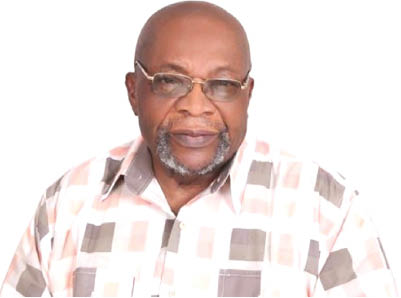How to immortalise Arthur Nwankwo – Chuks Iloegbunam
International journalist, newspaper columnist and author, Mr. Chuks Iloegbunam, has said that Arthur Nwankwo should be remembered for his love for the printed word. Iloegbunam said this in an exclusive interview with Daily Trust Sunday during which he commented on Nwankwo’s life and writings. “He served the cause of history by putting contemporaneous happenings in […]

International journalist, newspaper columnist and author, Mr. Chuks Iloegbunam, has said that Arthur Nwankwo should be remembered for his love for the printed word.
Iloegbunam said this in an exclusive interview with Daily Trust Sunday during which he commented on Nwankwo’s life and writings.
“He served the cause of history by putting contemporaneous happenings in the cold print of permanent records and upholding the dictum that the pen is mightier than the sword,” Iloegbunam said. “Dr. Arthur Agwuncha Nwankwo taught the aggrieved that it was better to reach for the pen than grab a gun or set off a bomb. University chairs could be endowed in his name, libraries could be named after him, things like that. For a truth, he produced more academically than a lot of people after whom tertiary institutions have been named in this country and elsewhere.”
Iloegbunam added that Arthur Nwankwo’s political struggles were never in vain, particularly his pro-June 12, 1993 agitations alongside other activists against the General Ibrahim Babangida annulment of that year’s presidential election believed to have been won by Chief MKO Abiola.
“Arthur Nwankwo wrote on contemporary issues and was also a novelist. He boldly interpreted the movement of Nigeria’s transition in clear language and with engaging analysis. He was about the first Nigerian to write book-length work on the anguish of Biafra. He wrote many books on the critical topic. His National Outlook could be outlined in the simple language of live and let live. He wanted Ndigbo to be, but not at the expense of other Nigerian nationalities. He believed that amity could reign, so long as there was socio-political equity. His newspaper articles were always engaging as he attacked topics frontally, without minding who took offence.
“His Fourth-Dimension publishing company is a pacesetter in Nigerian indigenous publishing. Before him, Nigerian writers mostly had their works published by foreign publishing houses, some of which had Nigerian outposts – like Heinemann, Longman and Oxford University Press. Of course, the primary impetus of foreign publishers in Nigeria was the profit motive. That narrowed down the chances of nationals of this country getting published, whatever the quality of their output. But, with Fourth Dimension, the publishing of books by Nigerians greatly soared.
“There is hardly any known Nigerian writer of the era between 1974 and 1990 that was not published by Fourth Dimension. It was Arthur Nwankwo that published ‘The Nigerian Revolution and the Biafran War’ by General Alexander Madiebo in 1980. He did it at a time many Igbo writers and combatants in the civil war were afraid to air their views, lest they offend the Gowon regime.
“It was Fourth Dimension that first published two critical works by the revered Chinua Achebe. I refer to ‘Beware, Soul Brother’ (Achebe’s volume of poetry that won the Commonwealth Poetry Prize in 1972), and ‘The Trouble With Nigeria’, his essay on the Nigerian condition (1983). A lot of the university teachers of the 1970s and 1980s got their professorships thanks to the publication of their books by Arthur Nwankwo. It was Fourth Dimension that published Commando Colonel Joe (Air Raid) Achuzia’s ‘Requiem Biafra’ in 1986. It was Fourth Dimension that published Lindsay Barret’s ‘Danjuma: The Making of a General’ in 1979, the book that gave General T. Y. Danjuma’s side of the story of General Ironsi’s abduction and assassination. If you removed Fourth Dimension books from public view today, there would be a chasm of ignorance. he was simply visionary.”
Nwankwo authored over 20 books in his lifetime. They include, ‘Biafra: The Making of a Nation’, 1969; ‘Nigeria: The Challenge of Biafra’, 1972; ‘Nigeria: My People, My Vision’, 1980; ‘Can Nigeria Survive’, 1981; ‘Nigeria: After Oil, What Next?’ 1982; ‘How Jim Nwobodo Governs Anambra State’, 1983; ‘Corruption in Anambra State’, 1983; ‘Civilized Soldiers: Army-Civilian Government for Nigeria’, 1984; ‘National Consciousness for Nigeria’, 1985; ‘The Igbo Leadership and the Future of Nigeria’, 1985 , ‘Before I Die: Arthur Nwankwo Vs Olusegun Obasanjo’ which is a chronicle of a series of correspondence he had with former President Obasanjo on the debate concerning the type of democratic government Nigeria should adopt, among other books.
Nwankwo passed on at the age of 77 at University of Nigeria Teaching Hospital, Ituku-Ozalla, Enugu.
